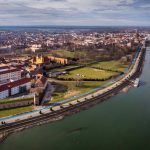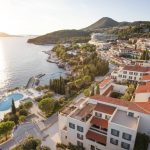As Poslovni Dnevnik/Marta Duic writes, in cooperation with the Croatian Association of Counties, Poslovni dnevnik to see how various Croatian counties stand after the pandemic year, and the first interlocutor among many was Ivan Anusic, the prefect of Osijek-Baranja County.
“The situation isn’t ideal, the large projects for which we’ve provided funds have been slowed down and the realisation has not started at the pace we’d initially planned. However, we found secondary ways of financing and started out with them, but the pandemic left its mark on us, as it has on the whole world,” said Ivan Anusic.
According to Ivan Anusic, this eastern Croatian county was looking for a balance between the economy and the situation with public health, and they wanted at least a part of the economy to function in the given conditions, despite the difficulties involved. Although the large economic systems that can hold up their own weight haven’t really been deprived, the catering and hospitality sectors were certainly deprived.
“Slavonia is important for food production and we saw that back in early March (2020) when we were greeted by the first lockdown. Then, we came to the conclusion that food production must be self-sufficient for us who live in Croatia, and later that we must place these products on foreign markets. That must be the priority of our government,” believes Anusic.
When they heard that Meggle was leaving, says Anusic, they had to act urgently. Too much politics infecting everything in this part of Croatia let it go down the drain, maybe Osijek isn’t our biggest city, but it did have the biggest industry. By shutting down Meggle, we not only lost our jobs but also our tradition and we’re glad that we managed to arrange everything with Belje. Unfortunately, there wasn’t so much luck for the sugar factory,” explained Ivan Anusic, noting that the future of Slavonia should be agriculture.
As he claims, Slavonia cannot build a future on tourism, although intensive work is being done on continental tourism, this area was created for agricultural production, and Anusic sees the future of Slavonia in ecological production. The construction of the Distribution Centre for Fruits and Vegetables has started, and it is a project worth a massive 101 million kuna that will include small farmers and they will be able to store, dry, pack, sort and create added products from their hard work.
“The defeat of every government happens when young people have to leave to get their bread. Slavonia has been communicating this sort of negative story out to the world for many years now, and it was also communicated by those who made it so. We don’t need any special help, we just need to be allowed to develop our resources and have those resources in our own hands. Perceptions are slowly changing, European Union (EU) funds are there for us and we have a chance to rise like other Croatian cities and build a story of our own,” concluded Osijek-Baranja Prefect Ivan Anusic.
For more on Slavonia, follow our lifestyle page.









